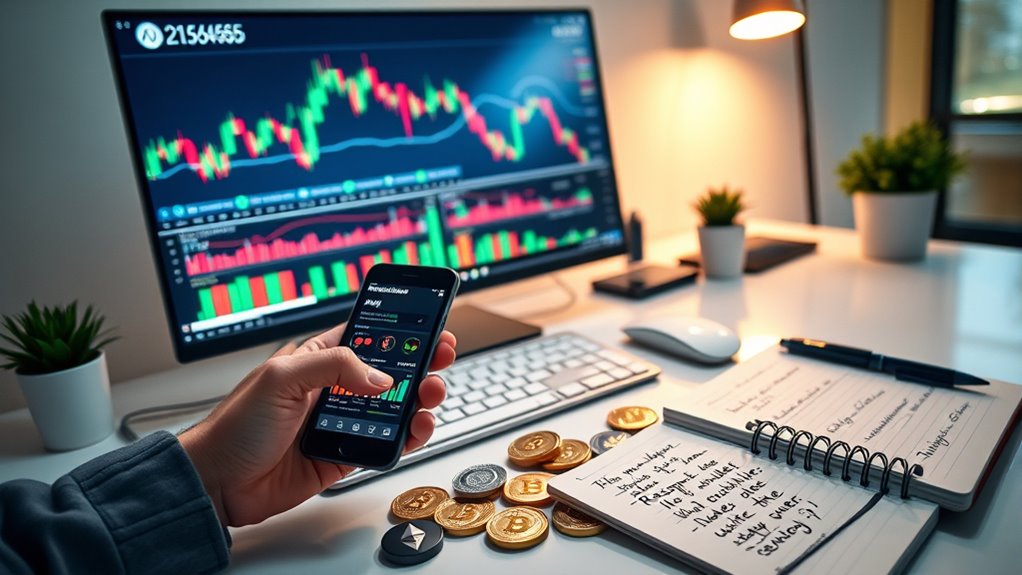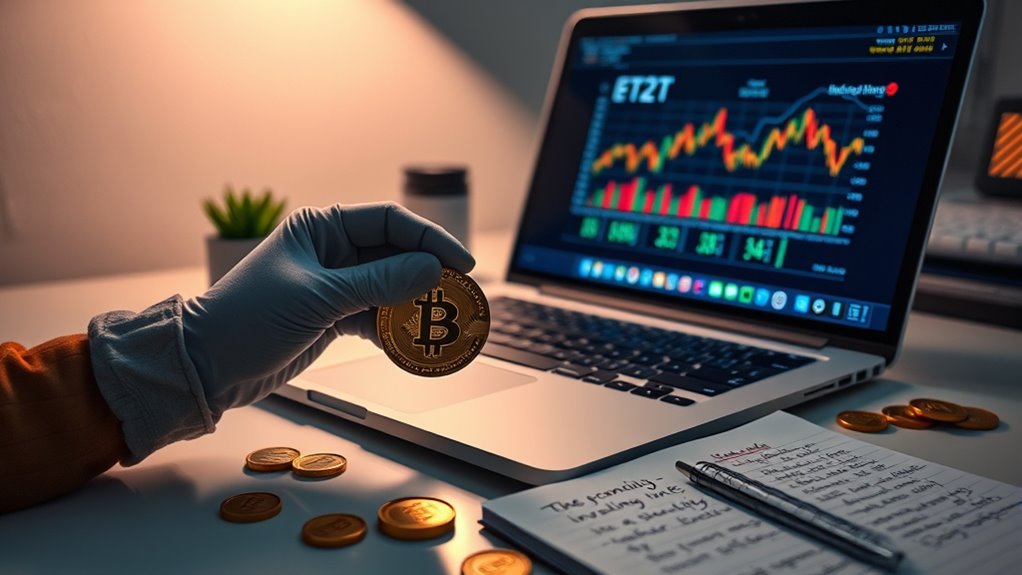To start investing responsibly in crypto and digital assets, focus on understanding market volatility and regulatory requirements. Always verify platform legitimacy, stay compliant with AML and KYC rules, and develop a solid risk management plan. Diversify your investments and avoid impulsive decisions based on social media hype. Patience and continuous education are key to steering through this fast-changing environment. If you want to build a sustainable approach, explore proven strategies tailored for long-term growth.
Key Takeaways
- Understand market volatility and diversify investments to manage risks effectively.
- Stay informed about evolving regulations and ensure compliance with AML, KYC, and tax laws.
- Conduct thorough research and avoid emotional trading to make responsible investment decisions.
- Use secure storage methods and protect digital assets from theft or loss.
- Maintain patience and continuous education to adapt to market changes and build a resilient portfolio.

Have you ever wondered how digital assets are transforming the way we think about money and investment? The rise of cryptocurrencies and other digital assets has introduced new opportunities, but it also brings unique challenges. As you venture into this space, understanding the importance of regulatory compliance becomes critical. Unlike traditional investments, digital assets operate in a rapidly evolving legal landscape. Regulations vary across countries and jurisdictions, and staying compliant isn’t just about following the law—it’s about protecting your investments from potential legal issues. You need to be aware of the rules around anti-money laundering (AML), know your customer (KYC) requirements, and tax obligations. Ignoring these can lead to penalties, loss of assets, or even legal trouble. The good news is that many reputable exchanges and platforms are working to meet regulatory standards, making it easier for you to trade responsibly. However, it’s your responsibility to do your homework, verify the legitimacy of platforms, and keep up with changing regulations. Additionally, understanding vertical storage solutions can help you better organize your digital assets securely and efficiently. Market volatility is another major factor to ponder when investing in digital assets. Unlike traditional assets like stocks or bonds, cryptocurrencies can experience dramatic price swings within short periods. This volatility can be both an opportunity and a risk. If you’re not prepared, sudden drops in value can lead to significant losses. It’s essential to approach digital asset investing with a clear strategy and risk management plan. Don’t invest more than you can afford to lose, and consider diversifying your holdings to mitigate risks. Keep in mind that markets are influenced by various factors, including technological developments, regulatory news, macroeconomic trends, and even social media sentiment. Because of this, prices can fluctuate wildly based on perceived value rather than intrinsic worth. Staying informed and cautious helps you navigate these turbulent waters. Responsible investing in digital assets means balancing your enthusiasm with prudence. Respect the regulatory landscape by ensuring compliance and staying updated on legal changes. Recognize that market volatility is inherent and plan accordingly. By doing so, you can reduce potential losses and make smarter investment decisions. Remember, digital assets are still a relatively new frontier, and the environment is constantly shifting. Patience, education, and diligence are your best tools for building a sustainable portfolio. As you grow more comfortable, you’ll learn how to spot genuine opportunities and avoid pitfalls. Ultimately, embracing a responsible approach helps you harness the potential of digital assets while protecting your financial future. With the right mindset and knowledge, you’ll be better equipped to navigate this exciting, yet unpredictable, investment landscape.

TANGEM Wallet Pack of 2 – Secure Crypto Wallet – Trusted Cold Storage for Bitcoin, Ethereum, NFT's & More Coins – 100% Offline Hardware Wallet
THE HIGHEST LEVEL OF SECURITY: Tangem Wallet generates the private key that never leaves the card. Your crypto…
As an affiliate, we earn on qualifying purchases.
As an affiliate, we earn on qualifying purchases.
Frequently Asked Questions
How Do I Choose a Secure Digital Wallet for My Assets?
To choose a secure digital wallet, focus on hardware security features that protect your private keys, the essential codes granting access to your assets. Look for wallets with strong encryption, secure storage, and a reputable track record. Avoid online or software wallets that are vulnerable to hacking. A hardware wallet keeps your private keys offline, offering better protection against theft and unauthorized access, ensuring your digital assets stay safe.
What Are the Tax Implications of Investing in Cryptocurrencies?
When you invest in cryptocurrencies, you need to consider tax reporting and capital gains. Profits from selling or trading crypto are usually taxable, so you must track your transactions and report gains on your tax return. Keep records of your purchase prices and sale dates. Depending on your country’s laws, you might owe taxes on your capital gains, so stay informed and consult a tax professional for compliance.
How Can I Identify Trustworthy Crypto Exchanges?
Think of trustworthy crypto exchanges as sturdy bridges over turbulent waters. You spot them by checking exchange regulations, ensuring they comply with legal standards, and by reading user reviews for real experiences. Trustworthy platforms often have transparent fee structures, strong security measures, and responsive customer support. Look for reputable licenses and positive feedback. These signs help you avoid scams and confidently navigate your crypto journey, like crossing a well-built bridge to your digital assets.
What Are Common Scams to Watch Out for in Crypto Investing?
You should watch out for Ponzi schemes that promise quick, high returns with little risk, as they often collapse leaving investors empty-handed. Be cautious of fake tokens that seem legitimate but are just scams to steal your funds. Always verify project information, avoid offers that seem too good to be true, and stick to reputable exchanges to reduce your risk of falling for these common crypto scams.
How Do Market Fluctuations Affect My Digital Asset Portfolio?
You might feel your heart race as market fluctuations shake your digital asset portfolio. Volatility management becomes essential—suddenly, your investments can skyrocket or plummet. To protect yourself, apply diversification strategies that spread risk across different assets and tokens. Stay alert, monitor the market regularly, and resist panic selling. With these proactive steps, you’ll navigate the ups and downs more confidently, safeguarding your investments amid unpredictable crypto waves.

Crypto Seed Cold Storage Wallet with Engraver Pen Kit – Metal Plate and Etching Tool for Cryptocurrency Password Phrase Backup and Recovery
All Inclusive Kit for Crypto Seed Key Storage – Comes a Stainless Steel Plate & Tungsten Steel Engraving…
As an affiliate, we earn on qualifying purchases.
As an affiliate, we earn on qualifying purchases.
Conclusion
As you start your journey into crypto and digital assets, remember to prioritize responsible investing. Did you know that over 80% of retail investors believe cryptocurrencies are a good long-term investment? While the potential is exciting, always do your research, diversify your portfolio, and only invest what you can afford to lose. Staying informed and cautious helps you navigate this fast-paced world safely and confidently.
crypto trading platform with KYC compliance
As an affiliate, we earn on qualifying purchases.
As an affiliate, we earn on qualifying purchases.

Cryptocurrencies and Tradable Crypto-Tokens: Introduction to the Sector's Economic Design (Future of Business and Finance)
As an affiliate, we earn on qualifying purchases.
As an affiliate, we earn on qualifying purchases.









